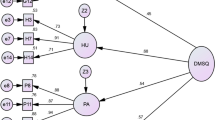Abstract
Objective (s)
Diabetes is the most common metabolic disease with an increasing prevalence throughout the world due to the changes in lifestyle. Appropriate self-care promotes the life condition of people with chronic illnesses and reduces the side effects of such diseases, so this study was designed to develop a scale for evaluating self-care in middle-aged patients diabetes.
Methods
In this methodological study, the following 4 steps were conducted for design and psychometric measurement of the questionnaire: 1) Data collection was carried out during a supplementary cross-sectional survey of the qualitative study; 2) determining the face validity (the assessment of facility, difficulty, and ambiguity of the items and their importance for patients) and content validity of the questionnaire (the assessment of appropriateness and necessity of items by experts opinions and measuring CVR and CVI; 3) the internal consistency of the questionnaire was evaluated by determining the Cranach’s alpha coefficient (α = 0.85), and 4) test-retest of the scale with a 2-weeks interval confirmed appropriate stability for the scale (ICC = 0.81). The normality of data was also evaluated using skewness and kurtosis. CFA was performed using AMOS version 24 software.
Results
The first version of this questionnaire was produced with 71 items, of which 27 items were deleted during the process of validity and reliability confirmation. The final version of the questionnaire was provided with 44 items. For this study, 460 samples were used to examine the psychometric properties of the self-care scale.The confirmatory factor analysis showed a good fit to the data. Before the performing CFA, KMO and Bartlett’s test of sphericity were evaluated and the results indicated an adequate sample (KMO = 0.956 and Bartlett’s test: χ2 = 14,288.048, df = 946, P < 0.001).
Conclusion
The findings showed that the designed questionnaire could assess self-care in patients with diabetes. This is a short, easy-to-use questionnaire that helps you understand what the patient needs to perform self-care behaviors.

Similar content being viewed by others
References
Ding CH, Teng CL, Koh CN. Knowledge of diabetes mellitus among diabetic and non-diabetic patients in Klinik Kesihatan Seremban. Med J Malaysia. 2006;61(4):399–404.
O’Connell S, Smeltzer C, Bare B, Hinkle JL, Cheever KH. Brunner & Suddarth’s textbook of medical-surgical nursing, vol. 1. Philadelphia: Lippincott Williams & Wilkins.
Wild S, Roglic G, Green A, Sicree R, King H. Global prevalence of diabetes: estimates for the year 2000 and projections for 2030. Diabetes Care. 2004;27(5):1047–53.
Esteghamati A, Etemad K, Koohpayehzadeh J, Abbasi M, Meysamie A, Noshad S, et al. Trends in the prevalence of diabetes and impaired fasting glucose in association with obesity in Iran: 2005-2011. Diabetes Res Clin Pract. 103(2):319–27.
Vinter-Repalust N, Petricek G, Katic M. Obstacles which patients with type 2 diabetes meet while adhering to the therapeutic regimen in everyday life: qualitative study. Croat Med J. 2004;45(5):630–6.
Denis K. Principles of internal medicine of Harrison endocrinology and metab. Thehran: Teimoorzade publication; 2005.
Fischer JA, Koszewski WM, Jones GM, Stanek-Krogstrand K. The use of interviewing to assess dietetic internship preceptors needs and perceptions. J Am Diet Assoc. 2006;106(8):A48.
Fitzgerald JT, Gruppen LD, Anderson RM, Funnell MM, Jacober SJ, Grunberger G, et al. The influence of treatment modality and ethnicity on attitudes in type 2 diabetes. Diabetes Care. 2000;23(3):313–8.
McDowell J, Courtney M, Edwards H, Shortridge-Baggett L. Validation of the australian/english version of the diabetes management self-efficacy scale. Int J Nurs Pract. 2005;11(4):177–84.
Carlstedt RA. Handbook of integrative clinical psychology, psychiatry, and behavioral medicine: perspectives, practices, and research. New York: Springer Publishing Company; 2009.
Lubkin IM, Larsen PD. Chronic illness: impact and interventions. Burlington: Jones & Bartlett Learning; 2006.
Fonseca V, Ismail K, Winkley K, Rabe-Hesketh S. Systematic review and meta-analysis of randomised controlled trials of psychological interventions to improve glycaemic control in patients with type 2 diabetes. Diabetes Care. 2004;27(10):2572–3.
Fu D, Fu H, McGowan P, Shen Y-E, Zhu L, Yang H, et al. Implementation and quantitative evaluation of chronic disease self-management programme in Shanghai, China: randomized controlled trial. Bull World Health Organ. 2003;81:174–82.
Tang TS, Funnell MM, Brown MB, Kurlander JE. Self-management support in “real-world” settings: an empowerment-based intervention. Patient Educ Couns. 79(2):178–84.
Fitzner K. Reliability and validity a quick review. Diabetes Educ. 2007;33(5):775–80.
Hajizadeh E, Asghari M. Statistical methods and analyses in health and biosciences a research methodological approach. Tehran: Jahade Daneshgahi Publications. p. 395.
Lawshe CH. A quantitative approach to content validity 1. Pers Psychol. 1975;28(4):563–75.
Waltz CF, Bausell BR. Nursing research: design statistics and computer analysis: Davis FA; 1981.
Polit DF, Beck CT. The content validity index: are you sure you know what's being reported? Critique and recommendations. Res Nurs Health. 2006;29(5):489–97.
Kaiser HF, Rice J. Little jiffy, mark IV. Educ Psychol Meas. 1974;34(1):111–7.
Henry JW, Stone RW. A structural equation model of end-user satisfaction with a computer-based medical information system. Inf Resour Manag J (IRMJ). 1994;7(3):21–33.
Lomax RG, Schumacker RE. A beginner's guide to structural equation modeling. London: Psychology Press; 2004.
Schreiber JB, Nora A, Stage FK, Barlow EA, King J. Reporting structural equation modeling and confirmatory factor analysis results: a review. J Educ Res. 2006;99(6):323–38.
Floyd FJ, Widaman KF. Factor analysis in the development and refinement of clinical assessment instruments. Psychol Assess. 1995;7(3):286–99.
Schneider Z. Nursing research: an interactive learning. London: Mosby Co.; 2004.
Baumgartner TA, Chung H. Confidence limits for intraclass reliability coefficients. Meas Phys Educ Exerc Sci. 2001;5(3):179–88.
Carter-Edwards L, Skelly AH, Cagle CS, Appel SJ. “They care but don’t understand”: family support of African American women with type 2 diabetes. Diabetes Educ. 2004;30(3):493–501.
Anbari K, Ghanadi K, Kaviani M, Montazeri R. The self care and its related factors in diabetic patients of khorramabad city. Yafteh. 14(4):49–57.
Kordi M, Banaei M, Asgharipour N, Mazloum SR, Akhlaghi F. Prediction of self-care behaviors of women with gestational diabetes based on Belief of Person in own ability (self-efficacy). Iran J ObstetGynecol Infertil. 19(13):6–17.
Moeini B, Teimouri P. Haji Masoudi S, Afshari M, Moghadam M, et al. Analyse of self-care behaviours and its related factors among diabetic patiants Qom Univ Med Sci J.10(4):48–57.
Nouhjah S. Self-care behaviors and related factors in women with type 2 diabetes. Iran J Endocrinol Metab. 16(6):393–401.
Mazlom SR, Firooz M, Hoseini SJ, Hasanzadeh F, Kimiaie SA. Self-care of patient with diabetes type II.
Parham M, Rasooli A, Safaeipour R, Mohebi S. Assessment of effects of self-caring on diabetic patients in Qom diabetes association 2013.
DeVellis RF. Scale development: Theory and applications. Thousand Oaks: Sage Publications.
Tabachnick BG, Fidell LS. Using multivariate statistics. 3st Editon. New York: Harpercollins; 1995.
Farrokhi A, Zareh Zadeh M, Karimi Alvar L, Kzaemnejad A, Ilbeigi S. Reliability and validity of test of gross motor development-2 (Ulrich, 2000) among 3-10 aged children of Tehran City. J Phys Educ Sport Manag. 5(2):18–28.
Acknowledgements
We would like to express our gratitude and appreciation to all respected professors, clinics, comprehensive health centers and participants in this study, and we wish God the best for each of these dear ones. The authors thanks to the many colleagues whose vignettes about dilemmas of improving quality shaped this paper, and the anonymous reviewers for their suggestions.
Funding
Financial support was received from the Mashhad University of Medical Science.
Author information
Authors and Affiliations
Corresponding author
Ethics declarations
Conflict of interest
The authors report no conflicts of interest in this work. The authors alone are responsible for the content and writing of the paper.
Ethics approval and consent to participate
This study is based on a research project approved by the Ethics Committee of Mashhad University of Medical Sciences with the code of ethics IR.MUMS.REC.1398.006 All procedures performed in this study were under the ethical standards of the institutional and/or national research committee and with the 1964 Helsinki declaration and its later amendments or comparable.
All project participants were informed of the project goals before the interview and have completed a written consent form and they have been assured of confidentiality. This research project is funded by Mashhad University of Medical Sciences.
All project participants were informed of the project goals before the interview and have completed a written consent form and they have been assured of confidentiality.
Additional information
Publisher’s note
Springer Nature remains neutral with regard to jurisdictional claims in published maps and institutional affiliations.
Rights and permissions
About this article
Cite this article
RobatSarpooshi, D., Taghipour, A., Mahdizadeh, M. et al. Design and psychometric evaluation of self-care behavior assessment tool in diabetic patients. J Diabetes Metab Disord 19, 709–716 (2020). https://doi.org/10.1007/s40200-020-00549-6
Received:
Accepted:
Published:
Issue Date:
DOI: https://doi.org/10.1007/s40200-020-00549-6




